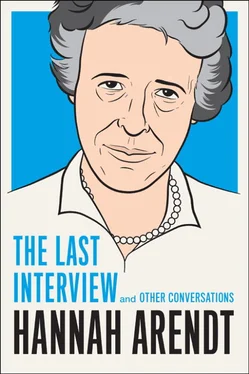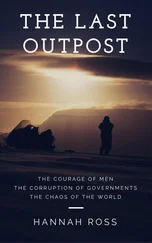ERRERA:Do you think that, at present, American leaders faced with other situations still want to know?
ARENDT:No. I don’t think that a single one is left. I don’t know. No. No, I take that back. But I don’t believe that… I think that McNamara was on Nixon’s list of enemies, if I am not mistaken. I saw it today in The New York Times. I think that is true. And this shows you already that this whole attitude has gone out of American politics—that is, on the highest level. It is no longer there. They believed, you see, these people already believed in image-making, but still with a vengeance, that is: Why didn’t we succeed with image-making? And one can say that it was only images, you know. But now they want everybody to believe in their images, and nobody should look beyond them, and that is of course an altogether different political will.
ERRERA:After what Senator Fulbright calls the “arrogance of power,” [b] Errera is referring to the concept that Arkansas Senator James Fulbright laid out in his 1966 book The Arrogance of Power , in which he took the U.S. government to task for the justifications it had offered for the Vietnam War.
after what we might call the “arrogance of knowledge,” is there a third stage that is arrogance pure and simple?
ARENDT:Yes, I don’t know whether it’s l’arrogance tout court. It is really the will to dominate, for heaven’s sake. And up to now it hasn’t succeeded, because I still sit with you at this table and talk pretty freely. So they haven’t yet dominated me; and somehow I am not afraid. Perhaps I am mistaken, but I feel perfectly free in this country. So they haven’t succeeded. Somebody, I think Morgenthau, [c] Hans Morgenthau, an influential scholar of international relations and foreign policy, and author of Politics Among Nations.
called this whole Nixon enterprise an “abortive revolution.” Now, we don’t yet know whether it was abortive—it was early when he said that—but there’s one thing one can say: successful it wasn’t either.
* * *
ERRERA:But isn’t the big threat these days the idea that the goals of politics are limitless? Liberalism, after all, presupposes the idea that politics has limited objectives. These days, doesn’t the biggest threat come from the rise of men and movements who set themselves unlimited objectives?
ARENDT:I hope I don’t shock you if I tell you that I’m not at all sure that I’m a liberal. You know, not at all. And I really don’t have any creed in this sense. I have no exact political philosophy which I could summon up with one ism.
ERRERA:Of course, but all the same your philosophical reflections lie within the foundations of liberal thought, with its borrowings from antiquity.
ARENDT:Is Montesquieu a liberal? Would you say that all the people whom I take into account as worth a little… I mean, “ moi je me sers où je peux ” [I help myself to what I can]. I take whatever I can and whatever suits me. I think one of the great advantages of our time is really, you know, what René Char has said: “ Notre héritage n’est garanti par aucun testament ” [Our inheritance is guaranteed by no testament]. [d] The correct quotation from Char is “ Notre héritage n’est précédé d’aucun testament , which is taken from Feuillets d’Hypnos (Paris: Gallimard, 1946). Arendt uses this quotation as the opening words of Between Past and Future: Eight Exercises in Political Thought (New York: Viking, 1968), where she translates it as “Our inheritance was left to us by no testament.”
ERRERA:… is preceded by no testament…
ARENDT:… n’est précédé par aucun testament. This means we are entirely free to help ourselves wherever we can from the experiences and the thoughts of our past.
ERRERA:But doesn’t this extreme freedom risk alarming many of our contemporaries who would prefer to find some ready-made theory, some ideology they could then apply?
ARENDT: Certainement. Aucun doute. Aucun doute.
ERRERA:Doesn’t this freedom risk being the freedom of a few, those who are strong enough to invent new modes of thought?
ARENDT: Non. Non. It rests only on the conviction that every human being is a thinking being and can reflect as well as I do and can therefore judge for himself, if he wants to. How I can make this wish arise in him, this I don’t know. The only thing that can help us, I think, is to réfléchir. And to think always means to think critically. And to think critically is always to be hostile. Every thought actually undermines whatever there is of rigid rules, general convictions, et cetera. Everything which happens in thinking is subject to a critical examination of whatever there is. That is, there are no dangerous thoughts for the simple reason that thinking itself is such a dangerous enterprise. So how I can convince… I think, nonthinking is even more dangerous. I don’t deny that thinking is dangerous, but I would say not thinking, ne pas réfléchir c’est plus dangereux encore [not thinking is even more dangerous].
ERRERA:Let’s go back to René Char’s words: “Our inheritance is preceded by no testament.” What do you think the inheritance of the twentieth century will be?
ARENDT:We are still there, you know—you are young, I am old—but we are both still there to leave them something.
ERRERA:What will we leave to the twenty-first century? Three quarters of the century have already gone by…
ARENDT:I’ve no idea. I’m pretty sure that modern art which is now rather at a deep point… But after such an enormous creativity as we had during the first forty years, especially in France, of course, this is only natural. A certain exhaustion then sets in. This we will leave. This whole era, this whole twentieth century will probably be one of the great centuries in history, but not in politics.
ERRERA:And America?
ARENDT:No. No, no, no…
ERRERA:Why?
ARENDT:You know, this country… You need a certain amount of tradition.
ERRERA:There isn’t an American artistic tradition?
ARENDT:No, not a great one. A great one in poetry, a great one in novels, in writing, et cetera. But the only thing that you could really mention is this, the architecture. The stone buildings are like tents of nomads which have been frozen into stone.
* * *
ERRERA:In your work, you’ve frequently discussed the modern history of the Jews and anti-Semitism, and you say, at the end of one of your books, that the birth of the Zionist movement at the end of the nineteenth century was the only political response the Jews ever found to anti-Semitism. [e] The Origins of Totalitarianism (New York: Harcourt, Brace & World, 1951), 155.
In what way has the existence of Israel changed the political and psychological context in which Jews live in the world?
ARENDT:Oh, I think it has changed everything. The Jewish people today are really united behind Israel. [f] This should be read against the background of the events of the day: on October 6, 1973, Egypt and Syria had attacked Israel, unleashing the Yom Kippur War.
They feel that they have a state, a political representation in the same way as the Irish, the English, the French, et cetera. They have not only a homeland but a nation-state. And their whole attitude towards the Arabs depends, of course, to a large extent on these identifications, which the Jews coming from Central Europe made almost instinctively and without reflection; namely, that the state must necessarily be a nation-state.
Читать дальше












